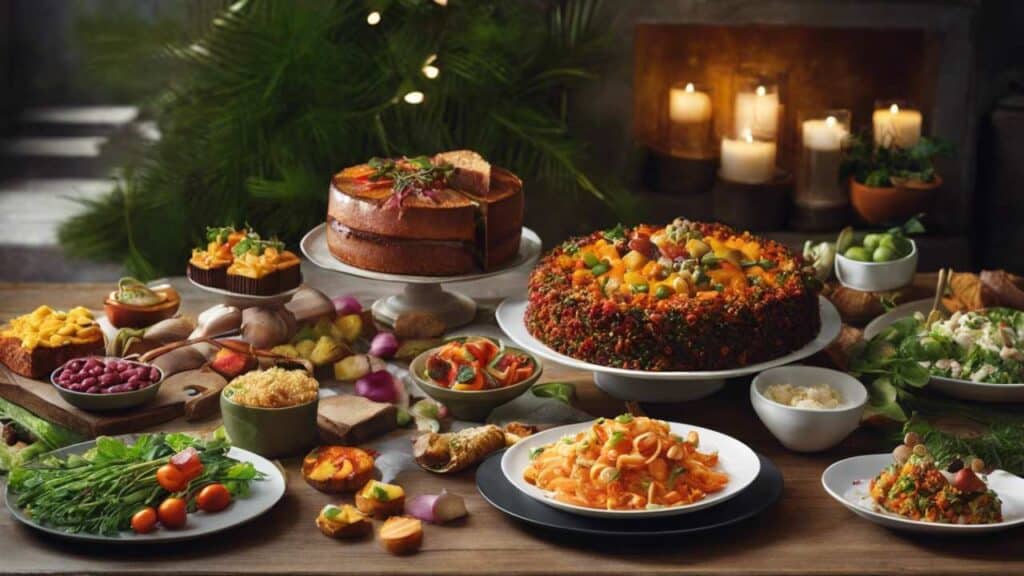The end of year holidays are often synonymous with family gatherings and hearty meals. For vegetarians and vegans, this period can be challenging, between family tensions and difficulties in finding alternatives to traditional dishes. In this article, we will address the challenges faced by vegetarians and vegans during holiday meals, as well as tips to overcome them.
Holiday meals, a source of dietary conflicts
The dietary choices of vegetarians and vegans can sometimes be a source of tension during holiday meals. According to a study conducted by the University of Michigan in 2016, about half of families report that dietary conflicts during holidays are a challenge for them. Many emotional conflicts are related to the content of plates during this time of year. Differences in dietary choices can become a new reason to judge others, creating uncomfortable situations for those involved.
Vegetarians and vegans may feel judged or criticized for their dietary choices, which can lead to tensions within the family. Journalist Larissa Dubecki, in an article for The Guardian, sums up the situation by saying, “Being vegetarian at Christmas is a bit like being vegetarian at any other time of the year, only with a much greater sense of observation and humor.”
Unsolicited nutritional advice
During holiday meals, it is not uncommon for vegetarians and vegans to be confronted with unsolicited nutritional advice from their loved ones. Often, these individuals become nutrition experts for the duration of a meal, questioning the dietary choices of those involved and their intake of essential nutrients.
It is important for vegetarians and vegans to stay informed about the specific nutritional needs of their diet and how to meet them. This way, they can respond to their loved ones' inquiries in an informed and reassuring manner, while avoiding heated debates around the table.
The challenge of culinary traditions
Holiday meals are often marked by strong culinary traditions, and not participating in them can be poorly received by some family members. Claire, 25 years old and vegan for nearly two years, testifies to this difficulty: “An affront to traditions that is poorly received.”
To avoid offending sensibilities, it can be wise for vegetarians and vegans to offer alternatives to traditional dishes, by adapting recipes or proposing new culinary creations. This will show that one can respect traditions while making ethical and responsible dietary choices.
- Offer vegetarian or vegan alternatives to traditional dishes
- Adapt recipes to make them compatible with one's dietary choices
- Create new culinary traditions that are environmentally and animal-friendly
In conclusion, holiday meals can pose a real challenge for vegetarians and vegans. Between family tensions, unsolicited nutritional advice, and the respect for culinary traditions, it is important to find solutions to reconcile one's dietary choices with the expectations of loved ones. Offering alternatives to traditional dishes, staying informed about the specific nutritional needs of one's diet, and remaining open to dialogue are key to enjoying peaceful and convivial holidays.
How can vegetarians and vegans enjoy holiday meals?
Vegetarians and vegans can enjoy holiday meals by adapting traditional recipes with plant-based ingredients, choosing vegetarian or vegan alternatives for main dishes, and ensuring a variety of vegetables, grains, and legumes for a balanced and tasty meal.
What are vegetarian and vegan alternatives for holiday meals?
Vegetarian and vegan alternatives for holiday meals include seitan roast, vegetable Wellington, mushroom pies, veggie patties, stuffed tofu, and legume-based dishes like lentil shepherd's pie. Desserts can include vegan Yule logs, dairy-free fruit pies, and cakes made with egg substitutes.
How to adapt traditional recipes for vegetarians and vegans?
Adapting traditional recipes for vegetarians and vegans involves replacing animal-based ingredients with plant-based alternatives, such as using plant milks instead of cow's milk, egg substitutes for cakes, vegan cheeses for gratins, and plant proteins like tofu, tempeh, or seitan for main dishes.

Maximilien Descartes est un rédacteur chevronné spécialisé dans les FAQ, avec plus de quinze ans d’expérience. Diplômé en journalisme de l’Université de Paris-Sorbonne, il a commencé sa carrière en écrivant pour diverses publications en ligne avant de se concentrer sur la création et la gestion des FAQ. A travers son travail, il s’efforce de fournir des informations claires, concises et pertinentes pour faciliter la compréhension du lecteur. Lorsqu’il n’est pas en train de peaufiner les moindres détails d’une FAQ, vous pouvez le trouver en train de lire le dernier roman de science-fiction ou de parcourir la campagne française à vélo.
